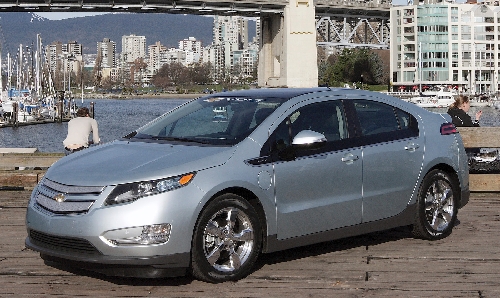Hype helps hybrids flounder
Do you think the media spends too much ink on alternative-fuel cars such as hybrids and electrics?
That's all we seem to write about anymore when it comes to new cars because that seems to be the direction we're all heading and, more importantly, that's where the automakers are spending their development dollars.
A decade ago, we were reporting on gadgets found inside cars while today we're writing about gadgets that are powering those cars. It's a writers' delight out there, but most of you reading this will not buy a hybrid or an electric car any time soon. Why? Well, there's the obvious stuff such as price, practicality and being leery about the reliability of new technology. But, if a recent study in the United Kingdom is to be believed, it's also because no one -- not the manufacturers and not even journalists -- is explaining how this new technology works or what the benefits are to you.
Perhaps that's because the journalists themselves don't even understand it, or are so used to being lapdogs for the industry that the acronyms roll off the keyboard without a thought, just as easily as they're read from a sales brochure or press release from an automaker.
My philosophy has always been to avoid acronyms and marketing terms and write about topics in plain English so people can understand them, which is really kinda-sorta the point of this job.
And that should be the goal from the automakers standpoint if they hope to make any headway selling the cars they're spending billions of dollars to create.
The first mistake is branding every piece of new technology that comes out that relates to fuel economy and the environment. Not only are we inundated with acronyms and buzzwords that mean nothing, but how many different names can you give to products that basically do the same thing?
Conversely, the term "hybrid" is applied to a whole group of automobiles that do very different things. The Chevrolet Malibu Eco is a far cry from the Chevy Volt and the Toyota Prius, but all three are referred to as hybrids. One "hybrid" is not automatically the same as the next, and presuming average buyers knew that -- which they most likely don't, according to the UK study -- how do they compare?
As always, I would recommend, compare on their features and the fuel economy versus price. But even that requires considerable reading and comparing to understand the ins and outs. For example, the Volt might not use any gasoline at all if the commutes are short enough not use up the batteries, but as a long-distance hauler it's no better on fuel than a Honda Civic that costs half as much. Without knowing that, someone might buy the Volt because a hybrid is a hybrid, right?
From a journalist's perspective, it's about writing what's relevant and not leaving unanswered questions. And what's relevant isn't always what the automakers are pushing or how they are spinning what they're pushing.
For example, "fuel efficient" is a relative term, but automakers routinely spout off about their fuel efficient new designs. Whether they are truly fuel efficient is subjective, depending upon whether you drive a bulldozer or a 20-speed mountain bike to work. But if it's pounded into your head long enough, you'll believe that anything is fuel efficient.
Even some journalists get wrapped up in it and will begin calling designs "fuel efficient" when all we can really do is compare the numbers and report whether a vehicle uses more or less fuel than before. But even to say that a vehicle is "more fuel efficient" (the keywords being "fuel efficient") than before implies that the previous vehicle was "fuel efficient" in the first place. Says who? Against what standards?
Same with the term "green" car. By their very existence, cars are far from green, yet, somehow, adding 700 pounds of stuff to them (electric motors and batteries, for example) makes them green. It's the marketing game at its finest and knowing this separates decent journalists from people who just cut and paste automaker press releases into their online blogs. There, readers learn nothing, but at least the blog is filled with all the right key words to get lots of hits and advertising money, right?
Automakers aren't the only ones trying to use environmental conscience to sell. In another example of propaganda, a phone company in Canada bragged how it was contributing to the greening of the world by enlisting a whole two Nissan Leaf electric cars into its fleet. I fail to see how adding more vehicles is "greening" anything, yet somehow this is big news to that effect.
I could go on and on, but the point is that you need to keep a sharp eye out to separate marketing hype from what's real and how that translates into tangible benefits. When in doubt, stick with the numbers. And, if the automakers don't do a decent enough job of explaining their technology, I'm here to tell you that we'll do our best.
Rhonda Wheeler is a journalist with Wheelbase Media, a worldwide supplier of automotive news, features and reviews. You can email her by logging onto www.wheelbasemedia.com and clicking the contact link.














